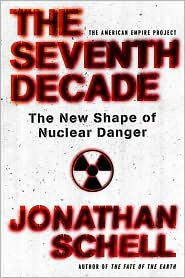 | |
| Author | Jonathan Schell |
|---|---|
| Publisher | Metropolitan Books, an imprint of Henry Holt & Company |
Publication date | November 2007 |
| Pages | 272pp |
| ISBN | 978-0-8050-8129-9 |
| OCLC | 122701842 |
| 355.02/170973 22 | |
| LC Class | U264.3 .S43 2007 |
The Seventh Decade: The New Shape of Nuclear Danger is a 2007 book by Jonathan Schell. It explores George W. Bush's nuclear policies and their potential effects. [1] [2] [3]